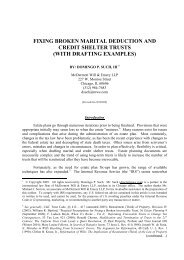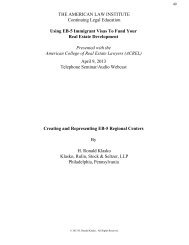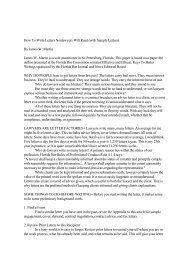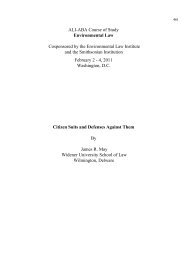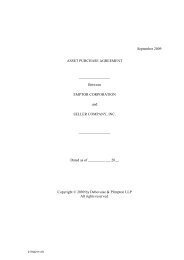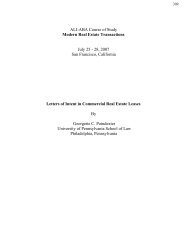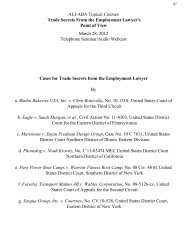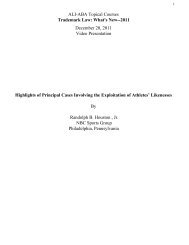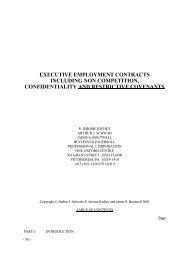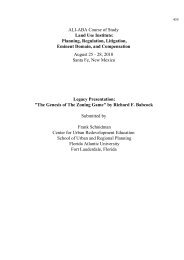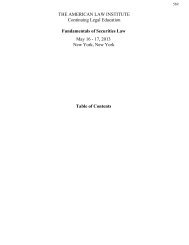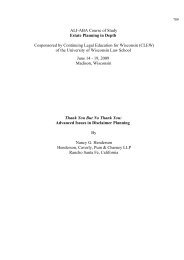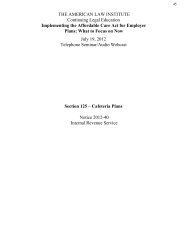Drafting an Enforceable Mandatory Arbitration Agreement ... - ALI CLE
Drafting an Enforceable Mandatory Arbitration Agreement ... - ALI CLE
Drafting an Enforceable Mandatory Arbitration Agreement ... - ALI CLE
Create successful ePaper yourself
Turn your PDF publications into a flip-book with our unique Google optimized e-Paper software.
<strong>Drafting</strong> <strong>an</strong> <strong>Enforceable</strong><br />
M<strong>an</strong>datory <strong>Arbitration</strong> <strong>Agreement</strong><br />
in the Employment Setting<br />
Amy McDowell<br />
California’s latest Supreme Court decision has bark<br />
<strong>an</strong>d bite—<strong>an</strong>d it is likely to set a pattern for the<br />
way other state courts interpret m<strong>an</strong>datory<br />
arbitration agreements in the employment context.<br />
THIS SUMMER, as the dog days of August<br />
drew to a close, the California Supreme Court<br />
ruled on the enforceability of m<strong>an</strong>datory arbitration<br />
agreements in a decision with a resounding<br />
bark <strong>an</strong>d a signific<strong>an</strong>t bite. The “bark”:<br />
Despite the fact that the case only directly regulates<br />
California employers, it is expected to set<br />
the tone for other state <strong>an</strong>d federal courts across<br />
the country, paving the way for enforceable predispute<br />
arbitration contracts in employment<br />
settings. The “bite”: Although the decision is<br />
generally viewed as positive for employers, it<br />
imposes strict st<strong>an</strong>dards for enforceability, requiring<br />
every employer to carefully review <strong>an</strong>d<br />
Amy McDowell is <strong>an</strong> associate in the Labor <strong>an</strong>d Employment Department of Jeffer, M<strong>an</strong>gels, Butler & Marmaro,<br />
in Los Angeles. Her practice includes counseling <strong>an</strong>d litigating all aspects of employment <strong>an</strong>d labor law.<br />
39
40 The Practical Lawyer December 2000<br />
revise their arbitration clauses. This article <strong>an</strong>alyzes<br />
the holding in Armendariz v. Foundation<br />
Health Psychcare Services, Inc., 6 P.3d 669 (Cal.<br />
2000), <strong>an</strong>d provides practical guid<strong>an</strong>ce on how<br />
to draft <strong>an</strong> enforceable agreement.<br />
WHAT IS A MANDATORY PRE-DISPUTE<br />
ARBITRATION AGREEMENT • M<strong>an</strong>datory<br />
pre-dispute arbitration agreements are contracts,<br />
signed before a dispute arises (often at<br />
the outset of employment), requiring the parties<br />
to submit their claims <strong>an</strong>d conflicts to <strong>an</strong> arbitrator<br />
rather th<strong>an</strong> a court of law. For the purpose<br />
of this article, they will be referred to as “m<strong>an</strong>datory<br />
arbitration agreements.” Before the<br />
Armendariz case, there was some question<br />
whether or not employers could require employees<br />
to sign these contracts as a condition of<br />
employment, <strong>an</strong>d, if so, what provisions the<br />
contracts could contain. Now, at least under<br />
California law, it is clear that employers may<br />
ask their workers to sign the agreement on a<br />
“take-it-or-leave-it” basis, subject to certain specific<br />
requirements.<br />
WHAT MAKES A MANDATORY ARBITRA-<br />
TION AGREEMENT UNENFORCEABLE •<br />
The gist of the Armendariz decision is that employers<br />
c<strong>an</strong> require workers to sign arbitration<br />
agreements but they c<strong>an</strong>’t abuse their superior<br />
bargaining power to make the employee give<br />
up certain rights. Specifically, the employer<br />
c<strong>an</strong>’t take adv<strong>an</strong>tage of its bargaining power in<br />
a way goes beyond merely choosing <strong>an</strong> arbitral<br />
forum for dispute resolution <strong>an</strong>d instead drastically<br />
limits <strong>an</strong> employee’s (but not the employer’s)<br />
options <strong>an</strong>d remedies.<br />
Using four disputed out of five total factors<br />
derived from the Supreme Court’s ruling in<br />
Gilmer v. Interstate/Johnson L<strong>an</strong>e Corp., 500 U.S. 20<br />
(1991), the Armendariz court reviewed the m<strong>an</strong>datory<br />
arbitration agreement <strong>an</strong>d found it unconscionable<br />
<strong>an</strong>d unenforceable. Those four<br />
disputed factors were:<br />
• Limitation of remedies;<br />
• Adequate discovery;<br />
• Written arbitration award <strong>an</strong>d judicial review;<br />
<strong>an</strong>d<br />
• M<strong>an</strong>datory employee payment of unreasonable<br />
costs <strong>an</strong>d fees.<br />
Finally, the court reviewed the agreement under<br />
general principles of unconscionability, finding<br />
that a lack of mutuality renders m<strong>an</strong>datory arbitration<br />
agreements signed as a condition of<br />
employment unenforceable.<br />
Limitation of Remedies<br />
The court held that m<strong>an</strong>datory arbitration<br />
agreements may not limit statutorily imposed<br />
remedies such as punitive damages or attorneys’<br />
fees. Because the agreement required the employee<br />
to arbitrate statutory claims, <strong>an</strong>d then limited<br />
the damages the employee could seek under<br />
those claims, it went beyond merely choosing <strong>an</strong><br />
arbitral forum <strong>an</strong>d was unenforceable.<br />
<strong>Drafting</strong> Tip<br />
The solution to this drafting mistake is simple—don’t<br />
include <strong>an</strong>y provisions in your arbitration<br />
agreement which limit the employee’s<br />
remedies to less th<strong>an</strong> applicable law, statutory<br />
or otherwise, allows.<br />
Adequate Discovery<br />
The court recognized that one of the purposes<br />
of arbitration is to streamline the dispute resolution<br />
process, <strong>an</strong>d acknowledged that limiting<br />
discovery, to some extent, was allowable.<br />
However, m<strong>an</strong>datory arbitration agreements<br />
must not limit discovery so much that the employee<br />
c<strong>an</strong>not obtain “discovery sufficient to<br />
adequately arbitrate” the claim, because such<br />
limitation may lead to a de facto frustration of<br />
the employee’s statutory rights.
M<strong>an</strong>datory <strong>Arbitration</strong> 41<br />
<strong>Drafting</strong> Tip<br />
Providing for “adequate” discovery is <strong>an</strong> ambiguous<br />
concept, <strong>an</strong>d it c<strong>an</strong> be difficult to differentiate<br />
between appropriately streamlined discovery<br />
<strong>an</strong>d unenforceable, insufficient discovery.<br />
However, it is advisable to either incorporate<br />
the discovery provisions of a reputable <strong>an</strong>d<br />
respected arbitration service, such as the Americ<strong>an</strong><br />
<strong>Arbitration</strong> Association, or, in the alternative,<br />
concurrently provide for a limited amount<br />
of discovery <strong>an</strong>d a me<strong>an</strong>s for seeking more discovery<br />
after the arbitrator’s approval.<br />
Written <strong>Arbitration</strong> Award<br />
<strong>an</strong>d Judicial Review<br />
To ensure that arbitrators comply with the<br />
statutes at issue in arbitration, m<strong>an</strong>datory arbitration<br />
agreements must not limit judicial review.<br />
Since the court was not presented with<br />
the precise issue of whether or not a particular<br />
arbitration award was enforceable in the<br />
Armendariz case, it declined to articulate a precise<br />
st<strong>an</strong>dard of judicial review required for<br />
m<strong>an</strong>datory arbitration agreements. However,<br />
the court did hold that, for successful <strong>an</strong>d<br />
me<strong>an</strong>ingful judicial review, the arbitrator<br />
would have to issue a written decision that reveals<br />
“the essential findings <strong>an</strong>d conclusions<br />
on which the award is based.”<br />
<strong>Drafting</strong> Tip<br />
This drafting mistake is also easily remedied.<br />
When preparing a m<strong>an</strong>datory arbitration agreement,<br />
clearly state that the arbitrator will be required<br />
to issue a written ruling regarding the<br />
dispute, <strong>an</strong>d do not attempt to limit a court’s review<br />
of that decision.<br />
M<strong>an</strong>datory Employee Payment<br />
of Unreasonable Costs <strong>an</strong>d Fees<br />
The largest portion of the court’s Gilmer factors<br />
discussion was devoted to the employee’s<br />
payment of unreasonable costs <strong>an</strong>d fees. The<br />
agreement at issue in Armendariz provided that<br />
the employee “pay his pro rata share of the expenses<br />
<strong>an</strong>d fees of the neutral arbitrator, together<br />
with other expenses of the arbitration incurred<br />
or approved by the neutral arbitrator,” as<br />
set out in California Code of Civil Procedure<br />
section 1284.2.<br />
The court devoted considerable attention to<br />
Cole v. Burns Intern. Security Services, 105 F.3d<br />
1465 (D.C. Cir. 1997), <strong>an</strong>d quoted its discussion<br />
regarding arbitration fin<strong>an</strong>cing at length, noting<br />
that possible costs include arbitrators’ fees r<strong>an</strong>ging<br />
from $500-$1,000 per day or more, a $500 filing<br />
fee, <strong>an</strong>d $150 per day for administrative<br />
fees, in addition to room rental <strong>an</strong>d court reporter<br />
fees. Although some of these fees mirror<br />
costs required of a plaintiff when filing a claim<br />
in court, <strong>an</strong>d were thus reasonable, the court<br />
pointed out that <strong>an</strong> employee would never be<br />
required to pay for a judge in order to have<br />
claims heard.<br />
Finally, the holding pointed out that other<br />
courts, including the Tenth <strong>an</strong>d Eleventh Circuits<br />
in particular, had reached essentially the<br />
same decision regarding arbitration fin<strong>an</strong>cing,<br />
concluding that when m<strong>an</strong>datory arbitration<br />
agreements are signed as a condition of employment,<br />
the employer must bear the arbitrators’<br />
fees.<br />
<strong>Drafting</strong> Tip<br />
Do not include <strong>an</strong>y provisions that may ultimately<br />
require the employee to pay the arbitrators’<br />
fees, even as part of <strong>an</strong> award of damages.<br />
Consider including other provisions clearly<br />
stating that each party will be required to pay its<br />
own other costs, such as witness fees, filing fees,<br />
or other amounts which they would be required<br />
to pay as part of litigating a claim in court.<br />
Lack of Mutuality<br />
In determining whether or not the Armendariz<br />
agreement was unconscionable, the court re-




